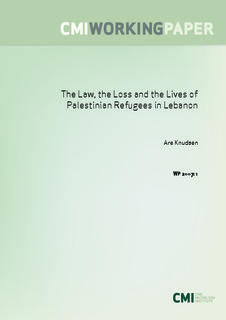The Law, the Loss and the Lives of Palestinian Refugees in Lebanon
Working paper
Permanent lenke
http://hdl.handle.net/11250/2436137Utgivelsesdato
2007Metadata
Vis full innførselSamlinger
- Bora-import [434]
Sammendrag
Lebanon has been a reluctant host to Palestinian refugees since 1948. A mainstay of Lebanese policies vis-à-vis the Palestinian refugees has been preventing their permanent integration and settlement in the country. The question of naturalising refugees is one of the most contentious political issues in Lebanon today. Palestinian refugees tend to live in conflict-ridden environments, often at the margins of the host society. This first of all applies to the camp-based refugees, who languish in dilapidated and overcrowded camps. Unable to return to Palestine and marginalised by the host society, they are caught in a legal limbo. In order to understand the legal plurality that governs their refugee status, it is necessary to examine their rights as refugees in international law, regionally as hosted by Arab League states and nationally as residents of Lebanon. The rights regime is complex and contributes to a critical “protection gap” for the refugees. In particular, there is a need to explore the “politics of citizenship” in post-war Lebanon that widened the protection gap and institutionalised legal discrimination of refugees. This paper argues that legal discrimination of Palestinian refugees was instituted amidst growing fears of their permanent settlement in the country and institutionalised through the executive’s patronage of the legislature and the judiciary. The paper was prepared under the multidisciplinary research project “The Poor and the Judiciary” funded by the Research Council of Norway (2005–07). Field research for the paper was carried out in 2005, 2006 and 2007.
Utgiver
Chr. Michelsen InstituteSerie
CMI Working PaperWP 2007: 1
